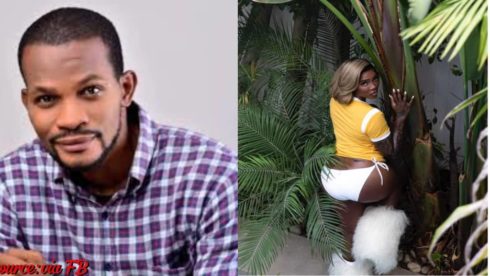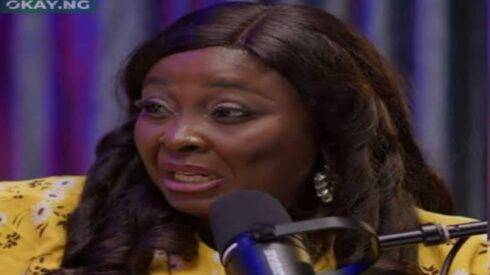Renowned Nigerian singer Tiwa Savage recently set social media abuzz with a series of striking images from her latest photoshoot. Known for her bold fashion choices, Tiwa’s photos featured daring outfits and poses that received widespread attention, sparking both praise and criticism among her followers. While many fans admired the singer’s confidence and style, others raised concerns about the appropriateness of the imagery.
Among those voicing their opinions was actor Uche Maduagwu, who is widely recognized for his often outspoken views on the Nigerian entertainment industry. Maduagwu, no stranger to controversy himself, took to social media to express his views, addressing Tiwa directly and sparking even further discussion. His reaction has since gone viral, with supporters and critics alike weighing in on his comments.
Uche Maduagwu’s Critique: A Call for “Modesty” in Nigerian Entertainment
In a post shared on his Instagram, Uche Maduagwu expressed disapproval of Tiwa Savage’s photoshoot, calling on the singer to embrace what he described as “modesty” in her public image. Maduagwu argued that as a role model to many young people, Tiwa should consider the influence of her image on her fans, particularly young girls who look up to her as an inspiration. His remarks reflect a recurring debate in Nigeria over the evolving standards of beauty and self-expression within the entertainment sector.
While some agree with Maduagwu’s views, others have pointed out that artists like Tiwa Savage are entitled to express themselves freely without societal constraints. Maduagwu’s comments have reignited discussions on the expectations placed on female public figures in Nigeria, and whether they should adhere to traditional values or embrace modern expressions of individuality.
Social Media’s Mixed Reactions: Divided Opinions on Maduagwu’s Comments
Social media users were quick to react to Maduagwu’s remarks, with opinions sharply divided between those supporting his stance and those defending Tiwa Savage’s right to self-expression. Many fans echoed Maduagwu’s sentiments, citing concerns about preserving “moral values” in the entertainment industry. However, others criticized him, arguing that his comments were an attempt to control female artists and their creative freedom.
This wave of online discourse reflects broader societal debates about gender expectations and cultural standards in Nigeria. While some argue that public figures bear a responsibility to act as role models, others feel that enforcing such expectations can be unfair and restrictive, particularly for women in the industry. The reactions highlight a complex intersection of modern values, cultural traditions, and individual autonomy.
Freedom of Expression vs. Societal Expectations: Where is the Line
Uche Maduagwu’s remarks bring attention to the balance between freedom of expression and societal expectations for public figures in Nigeria. Critics of Maduagwu argue that artists like Tiwa Savage should be able to portray themselves as they see fit, without facing judgment or scrutiny. They claim that limiting artists based on perceived societal expectations stifles creativity and sends a regressive message about autonomy and personal freedom.
On the other hand, supporters of Maduagwu’s views maintain that public figures have an implicit duty to set positive examples for their fans. They contend that embracing modesty and traditional values is essential in a society where celebrities have significant influence. This tension between self-expression and public responsibility is a recurring theme in discussions about celebrities in Nigeria.
Tiwa Savage’s Silence: Will the Singer Respond to Maduagwu’s Remarks
Despite the uproar, Tiwa Savage has not yet responded to Maduagwu’s comments. Known for her confidence and resilience, Tiwa may choose to address the criticisms in her own way or remain silent, allowing her fans and the public to interpret the situation as they see fit. Her silence has left fans and critics speculating about her views on the matter and whether she feels a need to justify her actions.
Should Tiwa choose to respond, her reaction could further fuel the debate, adding a new layer to the conversation surrounding freedom, creativity, and responsibility in the entertainment industry. Meanwhile, her fans continue to show support, encouraging her to remain true to her artistic vision regardless of external criticism.
Implications for Nigerian Entertainment: A Broader Discussion on Gender and Image
The controversy surrounding Tiwa Savage and Uche Maduagwu’s comments underscores ongoing conversations about gender roles and public image in the Nigerian entertainment industry. Female celebrities in particular face heightened scrutiny, with their choices often judged more harshly than their male counterparts. This incident highlights the additional pressures women face in the public eye, as they navigate expectations from both fans and the broader community.
Maduagwu’s critique and the surrounding debate may ultimately prompt more Nigerian artists to reflect on their roles as public figures and the standards placed upon them. As society continues to evolve, discussions like these could influence how celebrities approach self-presentation and challenge traditional norms, paving the way for a more inclusive understanding of freedom and artistic expression.
Table of Contents
Discover more from OGM News NG
Subscribe to get the latest posts sent to your email.














